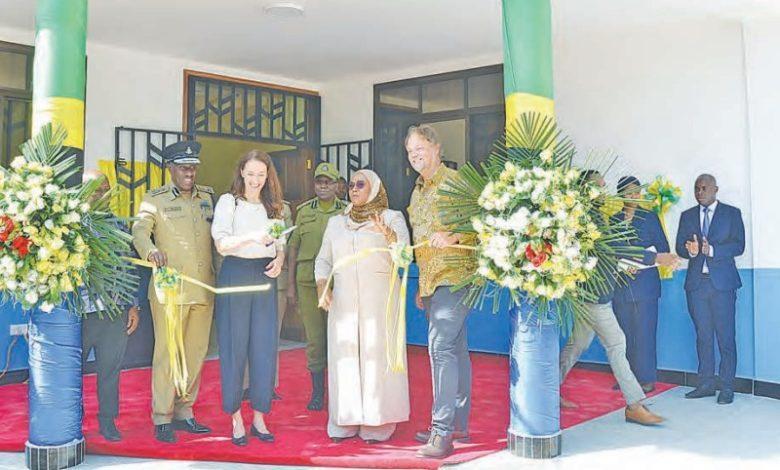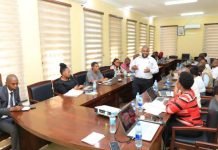Africa-Press – Tanzania. ON a breezy and cloudy Thursday afternoon, the courtyard of Mwembe-Madema Police Station was filled with a quiet sense of expectancy.
Police officers shuffled alongside young women in vibrant kangas, adjusted their badges, and a circle of local journalists checked their cameras and recorders one last time.
They had come to witness a modest ribbon cutting, but what unfolded was the unveiling of a much larger promise: a future in which victims of gender-based violence (GBV) are met with dignity, not doubt.
At the heart of the ceremony stood the freshly painted Gender & Children Police Desk, a building of white and blue colour.
“This facility is more than bricks and mortar,” declared Mr Mark Bryan Schreiner, Representative of UNFPA Tanzania, his words carrying across the crowd.
“It is a statement of commitment, to protect, support, and empower women and children who face violence and abuse.” The Desk, constructed under the ‘Chaguo Langu Haki Yangu (My Choice, My Right)’ programme with funding from the Government of Finland, is designed to do precisely that.
Inside, survivors of GBV will find sound proof interview rooms, child friendly décor, and officers trained in trauma informed care.
Crucially, the layout is disability inclusive: a ramp, tactile floor strips guide the visually impaired; wider doorways accommodate mobility aids; and interpreters for Zanzibar’s deaf community are just a phone call away.
For Schreiner, the building embodies a broader shift from policies drafted in conference halls to tangible services reachable by most means of transport.
Since 2022 the Chaguo Langu Haki Yangu partnership, linking UNFPA, both Union and Revolutionary governments, And also, civil society groups and the Police Force, has rolled out a web of survivor centred initiatives: two one stop centres in Tarime and Kishapu, 200 specially trained officers deployed during female genital mutilation “cutting seasons,” and a fortified national Child Helpline (dial 116).
“Systems change,” Schreiner told the audience, “Happens when protection on paper becomes protection in practice.”
The Mwembe-Madema Desk joins earlier police units in Mara and Shinyanga, each rewriting the script on how officers greet a survivor: not with interrogation, but with empathy.
“Your partnership,” Schreiner told Finnish diplomats present, “has made a profound difference in the lives of thousands.”
For a country whose development policy places gender equality at its core, the Tanzanian investment is both brand and beacon.
One desk will not erase centuries of harmful norms, but it can rewrite tomorrow’s headlines. “Let this Desk serve not just as a physical structure,” Schreiner urged, “but as a symbol of hope.”
In Mwembe-Madema, that symbol now stands, an ordinary building, perhaps, but extraordinary in the promise etched into its foundation: You will be heard. You will be safe.
You are not alone. Commissioner for Community Policing, Faustine Constantine Shilogile, speaking on behalf of Inspector General of Police (IGP) Camillus Wambura, read the ledger of violence aloud: 107,270 GBV offences recorded across Tanzania from 2022 to 2024.
In Zanzibar alone, 4,205 cases—more than half involving rape, were logged over the same period, most in Urban West Region where MwembeMadema sits.
“These figures are not mere statistics,” Shilogile cautioned, “they are the cries of our neighbours.” His voice dropped as he quoted Nobel laureate Dr Denis Mukwege: “Violence has no gender, anyone can be a victim, and everyone must be helped.”
To the men in the crowd, he added another reminder from actor Terry Crews: silence born of shame only shelters abusers.
The commissioner’s candour underscored why a police desk had to become, in his phrase, “an edifice of justice.” Outreach teams have already fanned across the country, teaching citizens how, and why to report abuse. Officials predict an initial spike in cases once doors open: a sign not of rising violence, but of rising trust.
Trust is what 22-year-old Halima lacked two years ago.
Deaf and living in Zanzibar Town, she braved a police station after surviving sexual assault, only to find no interpreter, no private room, and no one who understood her urgent gestures.
She left unheard and, ultimately, unprotected. Schreiner re told her ordeal to the gathered dignitaries, then invited them to imagine her returning today: “A quiet, accessible room.
An officer trained in respectful care. A space where she is believed.” Ms Tabia Maulid Mwita, delivering remarks for Zanzibar’s Ministry of Community Development, Gender, Elders and Children, pointed to the isles’ freshly launched 2025 2030 National Plan of Action to End Violence Against Women and Children.
Coupled with dedicated GBV courts, she said, the plan shortens the road to justice “from years to months.” Mwita is the Minister responsible for Information, and Minister Riziki Pembe Juma’s budget speech (Community development) days later had listed persistent violence, fragile family support systems, and a growing number of vulnerable households as top challenges.
But Ms Juma also cited “strong political will at every level, from President Hussein Ali Mwinyi down to the village Sheha,” reassuring sceptics’ that the strategy will not stall for lack of leadership.
Amid speeches of resolve, Finland’s role remained a recurring thread. The Nordic nation has bankrolled not only Mwembe-Madema’s Desk but similar builds on the mainland, training packages, and survivor shelters.
The Finland’s First Lady, Suzanne Innes-Stubb, who was a special guest at the opening of the GBV survivor centre, reaffirmed her country’s commitment to supporting Tanzania’s efforts in promoting gender equality and protecting children’s rights, highlighting the need for collaborative action to end gender-based violence.
Speaking during the event, Ms Innes-Stubb emphasized that true national development must go hand-in-hand with safeguarding the rights of women and children.
She underscored the importance of eradicating gender-based violence, saying that empowering girls and protecting women are key pillars of human rights and sustainable progress.
“When you empower a girl, you are advancing human rights, and when you protect a woman and a girl, you are helping the nation make meaningful strides in development,” she said.
Ms Innes-Stubb noted that the new facility would provide much-needed access to justice for vulnerable groups, calling it a “lifeline for those in need” and a platform for amplifying silenced voices.
She praised Tanzania’s efforts in addressing gender and child-related issues and pledged continued cooperation through the longstanding Finland–Tanzania partnership, which has spanned over five decades.
For More News And Analysis About Tanzania Follow Africa-Press







